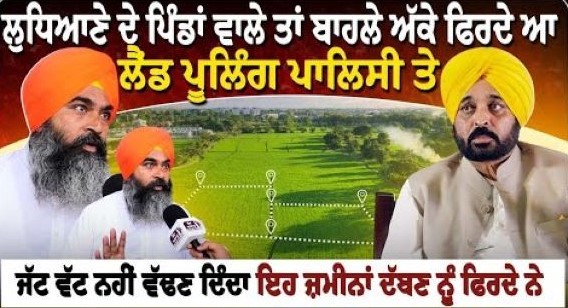 The land pooling policy introduced by the Punjab Government, particularly under the leadership of the Aam Aadmi Party (AAP), has emerged as a contentious issue in recent months. Aimed at promoting planned urban development, the policy seeks to acquire agricultural land near expanding cities like Jalandhar, Ludhiana, and Amritsar by pooling land from farmers and landowners. Once pooled, the land is to be developed by state agencies such as the Punjab Urban Development Authority (PUDA) or the Greater Ludhiana Area Development Authority (GLADA). After infrastructure like roads, drainage, and parks is created, a portion of the developed land is returned to the original owners, while the remaining part is used for public purposes or sold by the government.
The land pooling policy introduced by the Punjab Government, particularly under the leadership of the Aam Aadmi Party (AAP), has emerged as a contentious issue in recent months. Aimed at promoting planned urban development, the policy seeks to acquire agricultural land near expanding cities like Jalandhar, Ludhiana, and Amritsar by pooling land from farmers and landowners. Once pooled, the land is to be developed by state agencies such as the Punjab Urban Development Authority (PUDA) or the Greater Ludhiana Area Development Authority (GLADA). After infrastructure like roads, drainage, and parks is created, a portion of the developed land is returned to the original owners, while the remaining part is used for public purposes or sold by the government.
While the policy is framed as a “voluntary” alternative to forced land acquisition, it has triggered widespread resistance, especially in the rural areas surrounding major cities. A significant number of village panchayats have begun passing formal resolutions rejecting land pooling, expressing fears that the scheme is a backdoor attempt to displace farmers and make them landless. These resolutions often accuse the government of bypassing the democratic process, ignoring the voice of the rural population, and pushing an urban-centric agenda that benefits real estate developers rather than the common people.
One of the primary concerns raised by villagers is the fear of permanently losing their ancestral land. Though the government promises to return a portion of the developed land, farmers remain sceptical about the fairness of the deal, fearing manipulation, delays, or outright betrayal. Many also argue that their livelihoods are directly tied to agriculture, and converting fertile farmland into concrete settlements would destroy both their income and way of life. The lack of clear communication and transparency from the authorities has only deepened this distrust.
Another factor fueling opposition is the experience with land acquisition in Punjab, where several projects either failed to deliver or left landowners in legal and financial limbo. Many villagers point out that while the government claims to be acting in their interest, there has been no real consultation at the grassroots level. Officials and representatives are accused of entering villages without proper notice, distributing promotional materials, and pressuring individuals to sign consent forms without fully explaining the consequences.
This rising discontent has translated into active resistance. In several villages, including Kot Kalan near Jalandhar, AAP workers promoting the land pooling scheme were confronted by angry villagers, and their pamphlets were publicly burned. Similar protests have erupted across various districts, with slogans raised against the state government and its perceived betrayal of the farming community. Many of these incidents have also highlighted the emotional and cultural attachment that rural Punjabis have with their land—something they feel is being ignored in the name of development.
Politically, the land pooling issue has become a major flashpoint. Opposition parties like the Congress and Shiromani Akali Dal (SAD) have seized the opportunity to criticize the AAP government, accusing it of going back on its promises to farmers. They argue that the same party which once opposed forcible land acquisition is now using deceptive tactics to achieve similar goals. Amidst this backlash, the government continues to defend the policy as a necessary step toward modernization but may be forced to revise or halt its implementation if the resistance continues to escalate.
In essence, the growing trend of panchayats passing resolutions against land pooling signals a broader crisis of trust between the rural population and the state. The villagers’ opposition is not merely about land—it is about livelihood, dignity, and democratic participation. As Punjab stands at a crossroads between urban expansion and rural survival, the voices of its villages demand to be heard with sincerity and respect.